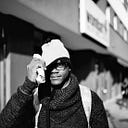BAP Productions considers what it is to be Man Enough
Man Enough, the new play from BAP Productions, might irk some feminists while pacifying some mothers.

Of course, feminists can be mothers — but mothers who think highly of their young sons might be more inclined to loving a play that worries over the male population. Feminists who think men already have the world shaped to their whims are less likely to feel that way.
The whole thing feels combustible, even if the same story told in any other time would be considered non-inflammatory.
But what is the story?

Well, Man Enough isn’t so much of a story as it is three entwined stories, all told by different men. Onyilo, Bruno and Thino might belong to different classes but are united by the possession of a penis, an appendage that doesn’t show up on the Terrakulture stage but gets referred to a couple of times.
Gideon Okeke is Onyilo, a man with a dream of producing a film. His friend, Thino, is a factory worker who is down on his luck but bound to go even lower as the play progresses. Ayoola Ayolola, Bruno, is a big man who wants to buy Onyilo’s dream even if the man himself only wants a collaboration.
One after the other, the actors come onstage and narrate their lives. This kind of monologue-driven play relies heavily on good writing and capable actors. On both counts, Man Enough acquits itself.
In a time when issues facing women are the thrust of many a social campaign, Man Enough helps us remember that some men have been left behind. Besides their bearing the appendage mentioned earlier, there isn’t much to be said for their masculinity. In fact, being a man without the power commonly attributed to men is to find oneself at a position less than a woman on the food chain. The thought goes thus: a woman has an excuse for being poor or weak; what is a man’s excuse?
This idea is broached in one scene where a woman demands sex and her partner can’t quite rise to the occasion. She says a man is supposed to want it all time and her partner’s inability is ridiculed. Who is to tell her that men, too, are affected by moods and context?
The man who has money, political power, strength and virility can issue orders, can reap all the benefits of the patriarchy. But those qualities are not evenly distributed. And when a man without those qualities through a trick of fate meets a woman with those qualities, the patriarchy cannot quite explain what happens. As pop act Victor Ad puts it, “So much pressure on a male figure”.
In Man Enough, the men are crumbling under the pressures handed to them by society and their women. There’s no real respite for men in such a position in real life — but maybe for the duration of this play, they might find succour knowing they are not alone.

